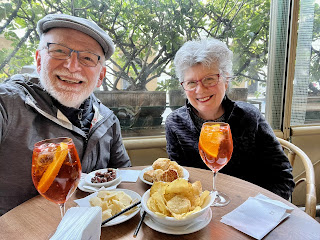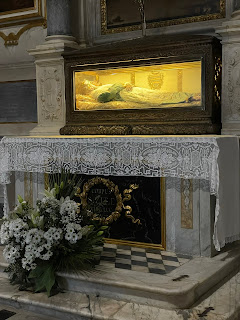 |
| Aperol spritz, Italy’s favorite aperitivo |
Two flights, one tram ride, one train ride, 17 hours of wearing masks, and Tom and I arrived in Lucca, Italy for the start of our first overseas trip since the Covid lockdowns began in March, 2020. We ignored jet leg, walked five miles our first afternoon, and celebrated with an Aperol spritz. It’s likely to be our first of many. Stopping around 5 p.m. to enjoy a spritz (Aperol bitters, Prosecco and sparkling water) with a buffet of free snacks, is a national pastime.
The week just after Easter and before the start of the late spring and summer music festivals turns out to be an ideal time to visit this Tuscan city, about an hour’s train ride from Florence. It’s best known for its ancient fortified walls rebuilt in the 15th-16th centuries, and later turned into 2.6 miles of paved walking and biking paths circling the historic center.
 |
| The walls of Lucca |
Crowds and and traffic are sparse this time of year, and Covid protections are in force, at least until May 1, including requiring masks in indoor public places and proof of vaccination to enter restaurants and ride long-distance trains.
Media reports made much of passengers cheering news that U.S. airlines would no longer require masks. We heard the announcement mid-flight on our way from Seattle to Amsterdam on Delta Airlines. No one cheered (maybe because it was the middle of the night), and most everyone kept their masks on. With cases again rising in the U.S., it feels like a particularly bad idea for people not to mask up. Apparently Air France agrees. We’re flying Delta’s french partner on our way back, and we’re happy masks are still required.
 |
| Masking up on the train |
I know many still feel unsure about traveling abroad, but it almost feels safer to be in Italy right now than in the U.S. Italians seem to respect the rules around protecting themselves and others, perhaps because they know what it’s like to be hit hard by strict lockdowns, hospitalizations and deaths. They use a digital “green pass” to prove vaccinations and boosters. Everyone here accepts American CDC cards, but it would be nice if we too had a standardized electronic pass.
One convenient change, perhaps brought on by Covid, is there seems to be no need to use cash for even the smallest purchases. We’ve been using Apple Pay everywhere, and although we came with 100 euros leftover from a previous trip, we’ve yet to spend hardly any cash.
Italy has been hit with inflation and soaring fuel costs due to the war in Ukraine, but, perhaps because the dollar is strong against the euro ($1.08), costs are reasonable, and even a bargain compared to prices at home. The bill for our first meal at a local trattoria was $40 for a shared antipasti, two pastas, wine, water and dessert. Local bakeries sell slices of Torta di Erbe, a Lucca speciality made with spinach or Swiss chard, raisins and pine nuts, for $2 a slice. A cappuccino at our favorite bookstore cafe is $1.50.
 |
| Our Airbnb with a very secure door |
Airbnbs are ideal for Covid-safe travel. Above, Tom unlocks the door to our suite in Lucca’s old town. Our host, Paola, and her family live upstairs. Guests get three rooms downstairs - a bedroom, sitting room and bathroom - with a private entrance. In the distance is a famous landmark, the Guinigi Tower, built by a wealthy family in the 1300s. Powerful families built towers as a symbol of their wealth. The garden on top was designed to get around a height restriction, and assure the owners that their tower would be the tallest.
 |
| Walking the walls |
Lucca is like three cities in one. There’s a section originally built by the Romans. Another dates to Medieval times and another to the Renaissance. Wealthy silk merchants financed beautiful piazzas, palaces and parks. Toilet paper has since replaced silk as the leading export, but tourism revenues ensure everything stays manicured and well-kept. The composer Giacomo Puccini was born here, and for those who can’t time their visit to a full-length opera, singers perform arias and duets nightly as part of the Puccini en la sua Lucca program. We joined about 50 others in a small chapel for an hour-long concert of selections from Puccini and Verdi compositions. Our seats were so close to the stage that we could make eye contact with the performers, and see the pianist’s musical score.
 |
| An intimate opera performance |
Where a Roman amphitheater once stood is the Piazza dell’Anfiteatro, a public square with a ring of buildings built in the same elliptical shape, and reached through four gateways. Cafes
Piazza dell’Anfiteatro
occupy prime real estate for people-watching and listening to summer jazz concerts. Flower-sellers filled the piazza this weekend with flowers and plants to celebrate the feast day of Saint Zita, patron saint of Lucca. Saint Zita, a servant and housekeeper, distributed bread to the poor. When the family for whom she worked caught her smuggling bread from the kitchen, they pulled open her apron, only to find flowers falling to the ground, or so the story goes. To celebrate her feast day, Lucca families bake bread and bring flowers to the Church of San Frediano where her body, believed to be naturally mummified, is displayed.
 |
| Flowers at the Church of San Frediano |
 |
| Saint Zita with hands and face uncovered for viewing |
Heavy rains, thunder storms and strong winds are breaking a four-month drought in Northern Italy just as we get ready to continue our trip along the Ligurian coast to Genoa. Our plan is to stop for two nights in Chiavari, a seaside town north of the Cinque Terre. If there is a place to hunker down during a rainstorm, this may be it. Most of the shops and restaurants are tucked into narrow streets protected by a network of porticos built by the Genovese in the Middle Ages. We’ll hope for a break in the weather to explore the arcades, parks and seaside, but if all else fails, there’s always this:


No comments:
Post a Comment